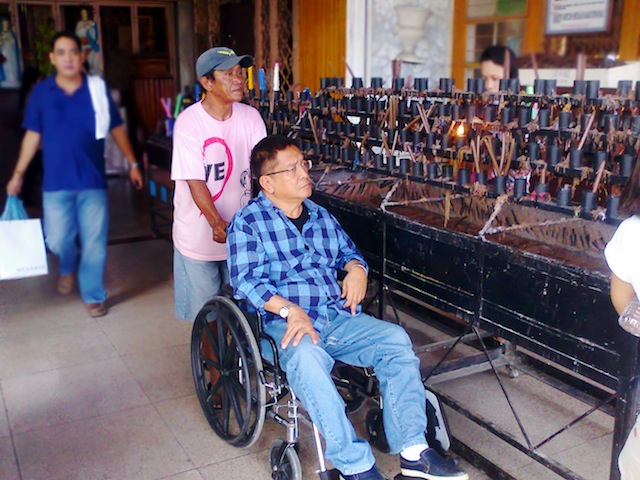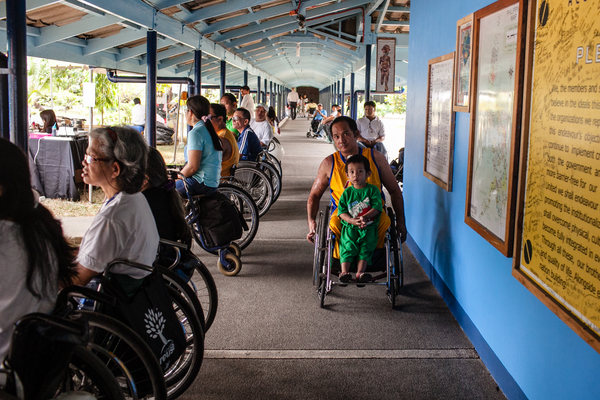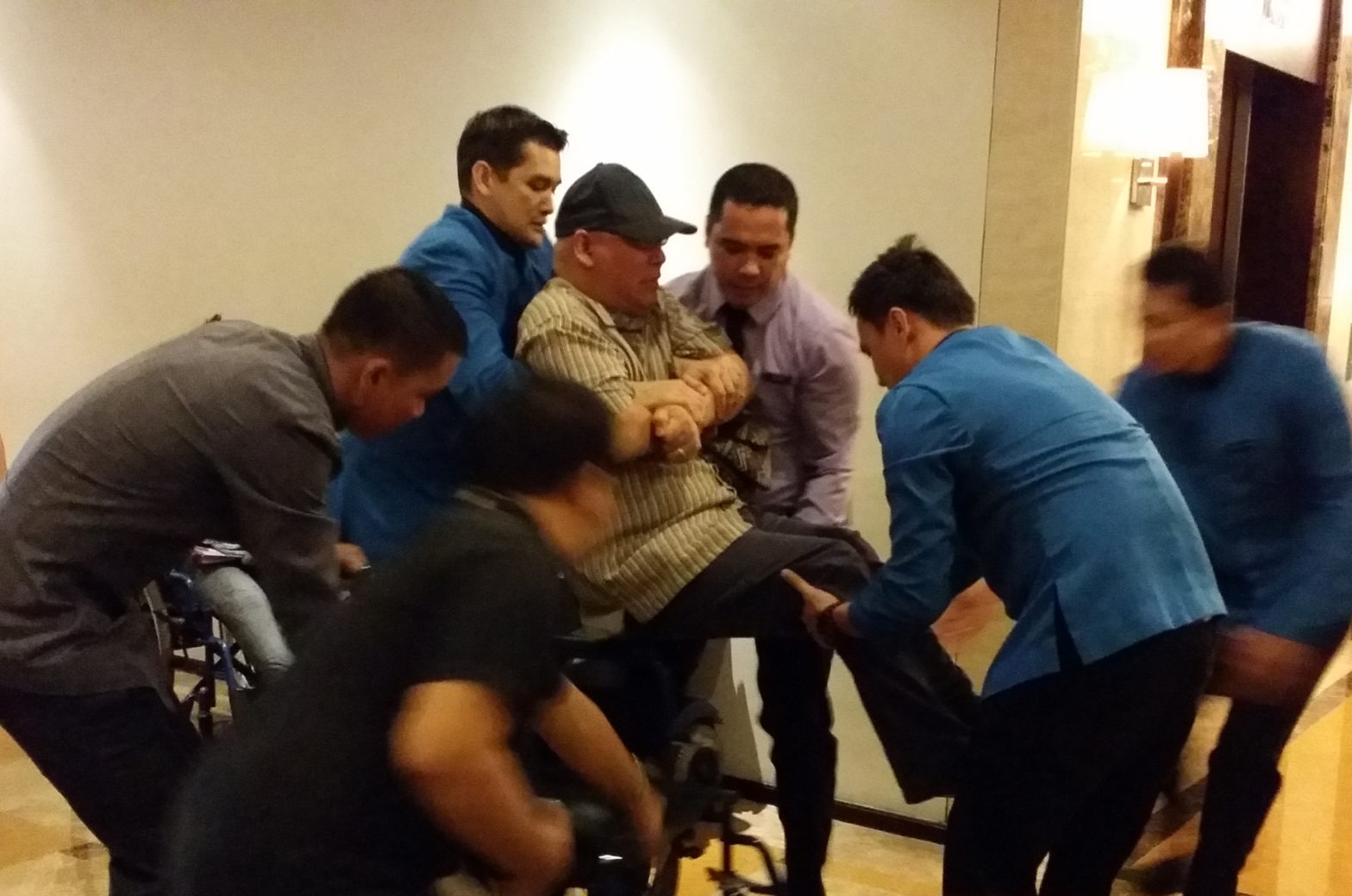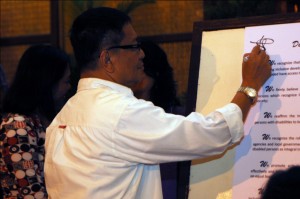
By KARLON N. RAMA
CEBU CITY – The provincial government of Cebu pledged to encourage more persons with disability to take part in the 2013 elections when it signed a commitment to support the Fully Abled Nation campaign that upholds PWDs’ right to suffrage.
Provincial board member Arleigh Sitoy, who some years back survived a stroke that has left him with a limp, signed in behalf of the provincial government.
Sitoy and other PWDs took center stage at the launching of the campaign in Cebu on March 28. Cebu province has a total of 6,899 number of households with PWD members according to the February 2011 data from the National Household Targeting System for Poverty Reduction of the Department of Social Welfare and Development. The records of the Commission on Elections (Comelec) as of July 2011 rank Cebu as the 11thprovince with the most number of registered PWDs.
Retired navy captain Oscar Taleon, who is blind and is the president and co-founder of the Alyansa ng may Kapansanang Pinoy (AKAP-Pinoy), also signed his commitment to the campaign. AKAP-Pinoy has 56 chapters nationwide and 450 disabled persons organizations (DPOs) as affiliates.
The Fully Abled Nation campaign is aimed at insuring that PWDs’ right to vote is observed in the midterm elections next year.
The event was attended by representatives of DPOs, other local government officials and support groups such as VSO Bahaginan and the Gualandi Volunteer Service Programme (GVSP), which led the launching of the campaign.
In his speech, Sitoy said it was time PWDs “live like everybody else.” He is known as a PWD rights advocate in Cebu having earlier proposed an ordinance giving tax incentives to business establishments in the province that have “barrier-free environments” and those that cater to tourism for PWDs.
“This is an important event,” Taleon said, as a troupe of hearing impaired dancers took over the stage and performed the Sinulog to hand gestures a teacher from the local First Integrated School for the Hearing Impaired synced to the drum beat.
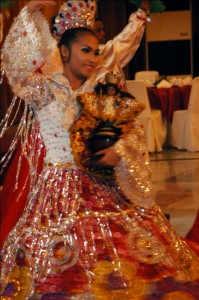
A recent Social Weather Stations survey noted a decline in the number PWDs taking part in the electoral process. From 60 percent in 2007, only 54 percent of the 1,200 PWDs surveyed were able to vote in the 2010. Among those who voted in 2010, the ortophedically impaired showed the highest percentage of participation at 56 percent, followed by the visually impaired at 51 percent, then the hearing/speech impaired at 48 percent.
While the Comelec has registered more than 700,000 voters as of January, the figure is small given how, said Comelec Commissioner Rene Sarmiento in a previous speech, the actual number of PWDs in the country is about 15 percent of the total 101 million population.
Though the Omnibus Election Code does not discriminate against PWDs and observes their right to suffrage, Cebu Provincial Election Supervisor Lionel Marco Castillano admits that many are unable to take part because the process of registering and voting is largely not barrier-free.
“Many of our offices are in the upper floors of buildings, many of which don’t have elevators,” Castillano said of the hindrances faced by PWDs during regular voter registration.
The problem of access is as pronounced when voting time comes, he said, as precincts are normally found in upper rooms of public school buildings.
“Comelec does not have any control over that. We can’t choose which buildings local government units place us. If we build our own or rent a place, it gets disallowed in audit. In Mandaue City, they placed us on the third floor. And we have no say in the design of schools,” Castillano added.
The Comelec has nonetheless conducted a special registration for PWDs in the Visayas for the entire month of March.
In May last year, the Comelec national office issued Resolution 9220 which prescribes guidelines for the nationwide registration of PWDs.
“We went off-site. We took our data capturing machines outside our third floor location and placed it in more accessible places in the barangays. We informed the barangays days ahead that they will be coming so they could disseminate the information to the communities,” Castillano revealed of the Cebu special registration that began March 1.
The only requirement for registration is a valid ID card or a birth certificate proving that the registrant is of legal age.
Resolution 9220 does not only mandate better access for the PWD registrants, it also revises the registration form to gather supplementary data like type of disabilities and the form of assistance needed come election day.
“I am thankful that the Comelec has conducted special registrations for people with disabilities, daghan man ma discourage og register og vote sa una kay samok, unya hasol pud labi na namo nga mga naka-wheelchair (a lot get discouraged to register and vote because of the hassle, particularly on us who are on wheelchairs),” said Shiela Padilla who has polio.
She now expects to vote in May 2013.
And there are added perks. ”Sa karon, nag-enjoy man pud mi sa special nga discounts nga gihatag sa mga disabled og sa mga senior citizen sa taga palitunon namo, dako gyud siya og matabang (we enjoy special discounts on whatever we buy, just like senior citizens. It helps),” said Jose Revel who also has polio and gets around with the help of crutches.
The Cebu City government allocates P16.8 million annually for PWDs and P12 million of that is spent for cash assistance. The remaining P4.8 million is allocated for the operation of the city’s Persons with Disability Affairs Office. – with Erika Lagunzad![]()
(VERA Files is a partner of the “Fully Abled Nation” campaign that seeks to increase participation of PWDs in the 2013 elections and other democratic process. Fully Abled Nation is supported by The Asia Foundation and the Australian Agency for International Development.)
